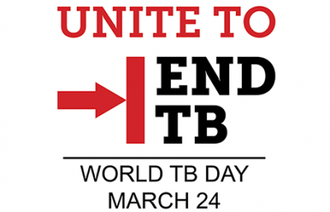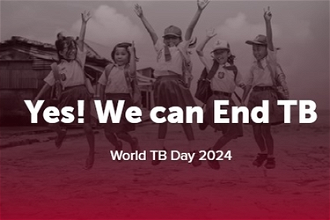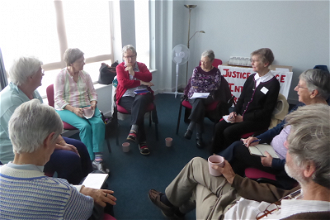Make TB history - Wanted: Leaders for a TB free world

On 21st February 1918, a train and a fleet of ambulances transferred 50 patients with tuberculosis (TB) from St Catherine's Hospital, Ramsgate to the new, purpose built Holy Cross sanatorium at Haslemere, Surrey. First World War bombing had destroyed parts of Ramsgate and the sisters of my order, the Daughters of the Cross of Liege were advised to seek a safer location for their patients. For 30 years the sanatorium continued to offer hope to many with tuberculosis, caring for patients who were often among the most vulnerable members of society.
In the 1950's, with the development of an effective cocktail of antibiotics, the number of patients with TB continued to fall and the sanatorium era passed into history. For a time Holy Cross became a small general hospital before transforming into the present day specialist rehabilitation and long-term care facility for people with extremely complex needs caused by profound injury or a serious neurological condition.
Today Holy Cross Hospital continues to 'Challenge the Limits' to the recovery of people whose lives have been turned upside down by illness or injury. The hospital celebrated its centenary with a year long programme of events which concluded on 21st February 2018 with a second talk on its early work by Dr Helen Bynum, author of Spitting blood: the history of tuberculosis. The work at Holy Cross Hospital truly made history!
No infectious disease has killed more people in human history than TB. Today TB kills almost five thousand children, women and men every day and leaves no country untouched. It is one of the leading killers among people of working age which creates and reinforces a cycle of ill-health and poverty, with potential catastrophic social and economic consequences for families, communities, and countries. 1.7 million people worldwide died from the disease in 2016 - more than Ebola, HIV and malaria combined.
TB is a neglected disease, largely ignored and under-funded and yet It is treatable and curable. If we act now, we could eliminate TB within a generation, but the continued development of drug-resistance could send us back to the pre-antibiotic era of 1918 when the first patients came to Haslemere.
After years of inadequate political efforts to contain and reduce the high human and economic costs of TB there are signs that world might be waking up to the importance of tackling the disease. In December 2016, the United Nations General Assembly agreed to hold the first ever High-Level Meeting on TB. This will take place in September 2018. In July 2017 the G20 meeting placed TB firmly in their list of global priorities for the first time. Then, in November 2017, the World Health Organisation (WHO) held a Ministerial Conference on TB in Moscow, reaffirming the importance of taking action on TB and antimicrobial resistance (AMR). It is clear that decision-makers have begun to realise that drug-resistant tuberculosis poses a clear and present danger to global health and the global economy, which the world cannot ignore.
None of this would have happened, however, without sustained pressure on the importance of tackling TB, as part of an increasing focus on the dangers of drug resistant infections. World TB Day on 24th March uses the date of Dr. Robert Koch's announcement of the discovery of the cause of tuberculosis as a moment to reflect on what still needs to be done to combat this disease. World TB Day is an opportunity each year to highlight the importance of taking concrete action to fight TB. The theme of this year's World TB day is,
'Wanted: Leaders for a TB-Free World - You can make history. End TB
Because of this year's unprecedented opportunity at the High Level Meeting, it is vital that we use World TB Day 2018 to build support among parliamentarians and the public to create momentum in the run-up to that meeting. Members of RESÚLTS UK (a member of the 'Stop TB partnership) are urging Prime Minister Theresa May to attend the event, and use her presence there to help develop a concrete plan for ensuring that countries make and deliver on ambitious commitments to tackle TB.
The Red Arrow pictured is a symbol for the goal to 'End TB'. It represents an unwavering commitment to move forward with this mission until we reach the finish line. Our goal is to 'Make TB history'. Because despite its devastating impact as the world's leading infectious killer, there is still the troubling fact that most people in the world think of TB as a disease of the past. I wonder what my sisters who welcomed the patients with TB to the Holy Cross sanatorium 100 years ago would think of that? I think the sisters of the 1950's (who must have rejoiced at the end of the need for a sanatorium) would be even more surprised and dismayed that TB is still posing such a threat to humanity. Why not learn more about how you can 'Make TB history'.
See: www.results.org.uk/news/wanted-leaders-tb-free-world
Or take the e-action at: https://results.eaction.org.uk/lobby/TBleaders
See also www.holycross.org.uk/


















